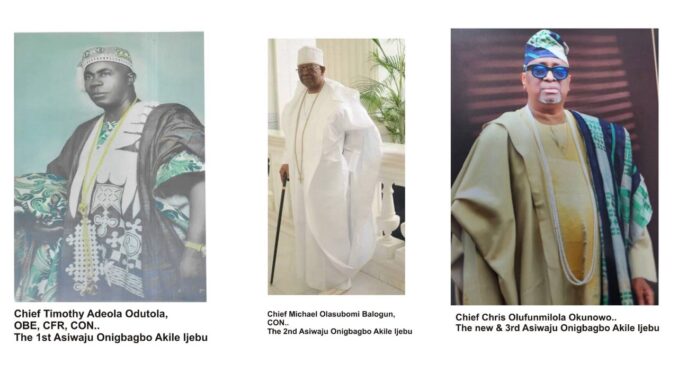
Like every Yoruba communities of the old, the Ijebu were predominantly pagans and traditionalists practicing the religion of their forbearers. They worshipped various traditional deities such as Sango, Egungun, Osun, Yemule, Ogun.. amongst others.
However, despite the strict adherence to paganism, the emergence of Christianity and Islam changed the belief and life style of the Ijebu as believers in the Almighty God. The early efforts of the Christian Missionary did not materialisebecause of resentment, rejection and even attack on the visiting Rev.David. Hinderer in 1854, Rev. Dr.Iving in 1854, Rev. James Johnson in 1877, Mr. John Ofojo in 1878 who was sent by Otunba Payne, Mr. Joseph Odusanwo and Mr. John A. Roberts 1889. However, the dynamics changed when the British defeated the Ijebu Army at Imagbon War and the triumphant entry of the British troops into Ijebu-Ode on May 20, 1892 opened the gate for direct trade, open practice of Christianity and increased Missionary efforts in Ijebuland. Moreover, the interest and efforts of the educated and leading technocrats among the Ijebu led by Otunba Payne and Dr. Joseph Odumosu, the most educated Ijebuman of his generation, a pioneering printer, publisher and author of books such as Iwe Egbogi, Iwe Iwosan, Iwe Irohin Ilu, Iwe Iranti Itan Ijebu, Iwe Itunmo Ala and Iwe Gbedegbeyo (Yoruba Dictionary), all published by his Printing Press between 1893-1900; his early Christian vanguards, preachers and prayer warriors included but not limited to Pa Emnanuel Ewumi, James Kogbe, Amis Awote, Gabriel Adebogun, Isaac Otubusin, Daniel Olusanya, Josiah Osilaja, Ezekiel Ogunade, Josiah Ogunade Aleshinloye and many converts and traditionalists including the Balogun Odueyungbo Bello Kuku.
However, the enthusiasm and interest of the converts encouraged the Missionary to continue to fish for Christ, win more souls and courage to approach the then reigning Awujale, Oba Adesimbo Aboki Tunwase for a parcel of land to build a worship centre for their faithfuls in order to educate and preach the new gospel. On November 1, 1892, the foundation laying ceremony of Emmanuel Church, Italupe, was performed. The church, however, is the first place of worship in Ijebuland symbolising the formal acceptance of Christianity after decades of stiff resistance by the Ijebu. Furthermore, Emmanuel Primary School was established in 1893,
The Cathedral Church of Our Saviour, Italowajoda in 1897, Christ Church, Porogun in 1902, Ijebu-Ode Grammar School in 1913. All these remarkable efforts of the Christian Missionary Society (CMS) encouraged the Ijebu and consolidated the rapid growth of Christianity in Ijebu-Ode, its villages and the entire Ijebuland in general. Moreover, the acceptance of the religion also encouraged the enlightenment of the indigenes through western education, opening-up the towns to direct trade and commerce with the Yoruba of the interland. It also gave the Ijebu a remarkable headstart in education, business, commerce, industry
and politics comparable to the other Yoruba towns in particular.
Moreover, the success story of CMS Anglican Church attracted other dominations like the African Church, Methodist, Catholic, Baptist, indigenous sects like C & S, Celestial, Aladura, Ayo Ni and several Pentecostal churches like RCCG, Winners, Mountain of Fire..amongst others in the modern time to build their churches, schools (primary, secondary, universities hospitals and other profit-centred enterprises in order to fund and support their Missionary resulting in rapid expansion of Christianity in Nigeria.
Over time, Christianity has become well entrenched in Ijebuland as a religion of God and way of life of its faithful adherents in the community.
As an organised religion, the head of the church is the Bishop or designated by other titles depending on the denominations. There are other honorary titles for non-religion leaders assisting the Body of Christ. The most prominent of such a honorary title is the Asiwaju Onigbagbo Akile Ijebu as the leader of Christians in the community. Such a personality is usually selected from a pool of committed elders with proven track records of service to the people, church and community at large.
In modern time, Chief Timothy Adeola Odutola, the late Ogbeni Oja of Ijebuland was the first title holder, the late Otunba Subomi Balogun as the second while Chief Chris Funlola Okunowo has been selected to succeed the last holder of the enviable and prestigious title peculiar to the Ijebu.
In a unanimous decision, CAN considered the various contributions of the new Asiwaju Onigbagbo Akile Ijebu to the growth of the church over the years which include but not limited to:
1.The yearly hosting of CAN Ijebu-Ode Adura Odun (Universal Week of Prayers) which was so dear to the heart of CAN and believers in Ijebu-Ode and beyond.
2.Annual sponsorship of Community Hymn Singing
3.Scholarship to school children 4.
Poverty alleviation program to widows
5.Renovation of churches/purchase of musical instruments to African Bethel Church..
amongst others.
Apart from some of these documented contibutions and in line with the objective of CAN, the new Asiwaju Onigbagbo Akile Ijebu has the personality, potential and charisma with interpersonal relationship skill across the border to connect and unite people in christiandom, helping them to grow their faith, finding the true essence of Christianity and build a peaceful society.
No doubt, the cap fits so well and I join the the Christian community and the entire Ijebu Nation to congratulate, Chief Chris Funlola Okunowo, the new Asiwaju Onigbagbo Akile Ijebu, a chip off the old block, a distinguished son from a distinguished family, an accomplished legal titan and administrator par excellence.
Oye a mo’ri o.
@ Engr Kayode Sote, FAEng
September 7, 2024


Be the first to comment